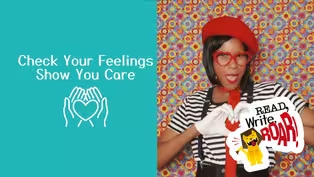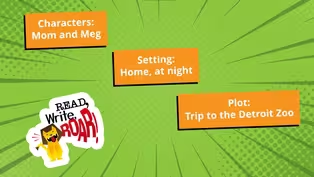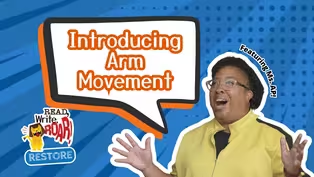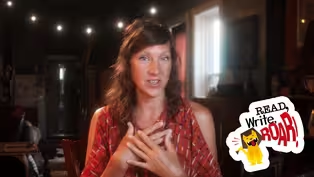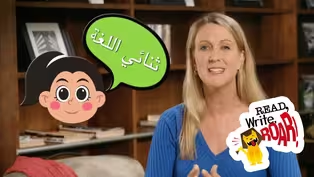Read, Write, ROAR!
How Interviews Work | Mr. Peterson | Read, Write, ROAR!
Clip: Season 1 Episode 1006 | 6m 52sVideo has Closed Captions
Join Mr. Peterson as he interviews an expert about Anishinaabemowin.
Join Mr. Peterson as he interviews an expert about Anishinaabemowin. Learn the importance of preserving this language, its historical roots, and even pick up a few phrases! Perfect for curious learners interested in language and history.
Problems playing video? | Closed Captioning Feedback
Problems playing video? | Closed Captioning Feedback
Read, Write, ROAR! is a local public television program presented by Detroit PBS
Read, Write, ROAR!
How Interviews Work | Mr. Peterson | Read, Write, ROAR!
Clip: Season 1 Episode 1006 | 6m 52sVideo has Closed Captions
Join Mr. Peterson as he interviews an expert about Anishinaabemowin. Learn the importance of preserving this language, its historical roots, and even pick up a few phrases! Perfect for curious learners interested in language and history.
Problems playing video? | Closed Captioning Feedback
How to Watch Read, Write, ROAR!
Read, Write, ROAR! is available to stream on pbs.org and the free PBS App, available on iPhone, Apple TV, Android TV, Android smartphones, Amazon Fire TV, Amazon Fire Tablet, Roku, Samsung Smart TV, and Vizio.
Providing Support for PBS.org
Learn Moreabout PBS online sponsorshiphi it's Mr Peterson have you ever wondered how reporters on TV or writers in magazines get their interesting stories well many times it's because of interviews with people interviewing is a great way to learn new things from an expert and share them with others today we're going to learn how to conduct an interview and discover a bit about Michigan's first language Anisha naam moan from an expert today we'll be talking with my friend Tana who is not only a teacher on read WR Roar but is also a speaker of Anisha na Moen before you start interviewing someone you need to know what you want to learn think about the person you're interviewing and what makes them special you want to choose someone who has interesting stories or important knowledge to share a person who is an expert in a topic you'd like to know more about I set up an interview with Tana because she is an expert in the area I want to know more about write down some questions you want to ask good questions are open-ended which means they can't be answered with just a yes or a no for example instead of asking do you like Michigan you could ask what do you like most about Michigan when it's time for the interview first you will see that I introduce myself and thank the person for their time you'll then hear my explanation of why I chose to interview them and what I hope to learn the next part of interviewing is asking questions and listening carefully to what the person says sometimes their answers will lead to new questions that hadn't been thought of before the interview we call these follow-up questions while the person is talking interviewers take notes or with permission record the interview this is important because it helps you remember what they said later finally after all of the questions are asked thank the person again for their time it is also nice to follow up with a thank you note or email now that you know the steps to conduct an interview follow along with my interview to see it come alive hi Tiana thank you so much for taking the time for our interview today absolutely Anie Bojo tanman and disas makan doam Bing and Don jaaba I'm so happy to be here so that was a traditional inab greeting and I said hello my name is and then I also said that I am bear clan and I'm from pating which is the original name for sus fre Michigan wonderful well I have a few questions that that's okay if I could ask you you might can you tell us how to pronounce the language yeah so we say anab Moen so in a shab is the part that talks about the people and the Moen part is that talks about that that's the language we speak and it's shab menen wow and so how long has this language been spoken my goodness so from time and Memorial it's one of the things that we kind of say from the beginning of time um so what's really neat about um a nanab perspective in culture is that we don't have the same perspective or understanding of time that others might as in a colonial way that there are only 12 months in a year and there are only so many set days in that month um and so we believe believe that um originally that we were set down by that Eastern Seashore over by New York at the beginning of the St Lawrence River and so through the years we migrated we were given a prophecy and then migrated West and then ended up in Michigan and then also Wisconsin Minnesota North Dakota South Dakota and also up in Canada well I'm kind of excited can you teach us a few words or phrases from Anisha Mo of course I can so the first one is Ani and that is our informal way of saying what's up Hi friend how you doing so Anie an perfect now the next one that you would want to say like to your elders or in a um ceremonial setting might be boou Bou M Mig Mig now migu is actually a new word that is not from our original language or um it was a word that was actually created in the time of the furra what it really means or at least some of my knowledge Keepers and language keep keepers have said is that it really means is that what you have traded is enough so everybody knew that you were grateful um me mcua wendam um that's what we say grateful for now um I am grateful n Miga wendam uh for the things that or the people in your life so oh and I'm grateful that you're sharing this with us I have one more question for you okay are there words we regularly use in English that have their roots in this language you would not believe how many words in Michigan there are like the word Michigan to begin with Okay so let's start there so Michigan really started as get you get or k which was Big L and I want you to close your eyes in picture this really long game of telephone remember where you're like Whispering into your neighbor's ear a word and then the next person and then the next person and then the next person has to listen and listen and listen and see if they come up with the same thing at the end that's what happened to some of our words so g g became Michigan Tiana thank you so much for your time and your knowledge it it just it shared so much about this beautiful language thank you oh you are so welcome n and M GL for having me did you enjoy that interview did you learn something new I learned to say what's up Ani and I learned that the names of so many places around us have their roots in the Anisha Mo language remember when you conduct an interview that you should be curious listen carefully and always show respect to the person you're interviewing oh and don't forget to share what you've learned about your topic with your friends and family so they can learn something too happy interviewing
Cultural Awareness in Michigan: Respect & Inclusivity Explained
Video has Closed Captions
Clip: S1 Ep1006 | 4m 18s | Introduce the importance of cultural awareness through real-life examples. (4m 18s)
Developing Characters & Plot! | Ms. Meg | Read, Write, ROAR!
Video has Closed Captions
Clip: S1 Ep1006 | 4m 5s | Miss Meg explores how dialogue shapes characters, setting, and plot. (4m 5s)
Read, Write, ROAR! Restore - Introducing Arm Movement
Video has Closed Captions
Clip: S1 Ep1006 | 2m 22s | Join Ms. AP in this 2-minute movement snack that combines running in place with arm lifts. (2m 22s)
Storm Soundscape | Ms. Audra | Create the Sounds of Nature
Video has Closed Captions
Clip: S1 Ep1006 | 2m 15s | Use your breath and body movements to recreate the excitement of a storm. (2m 15s)
Telling Intergenerational Stories | Mrs. DeFauw | Read, Write, ROAR!
Video has Closed Captions
Clip: S1 Ep1006 | 5m 45s | Learn how to preserve and share family stories for generations to come. (5m 45s)
Providing Support for PBS.org
Learn Moreabout PBS online sponsorship

- Home and How To

Hit the road in a classic car for a tour through Great Britain with two antiques experts.












Support for PBS provided by:
Read, Write, ROAR! is a local public television program presented by Detroit PBS
